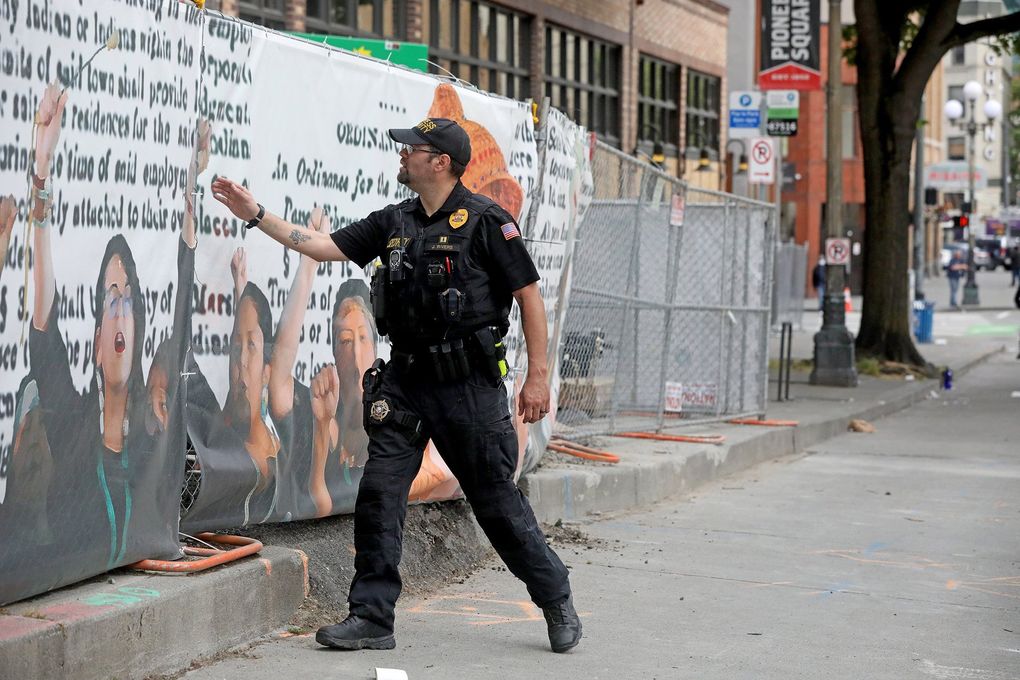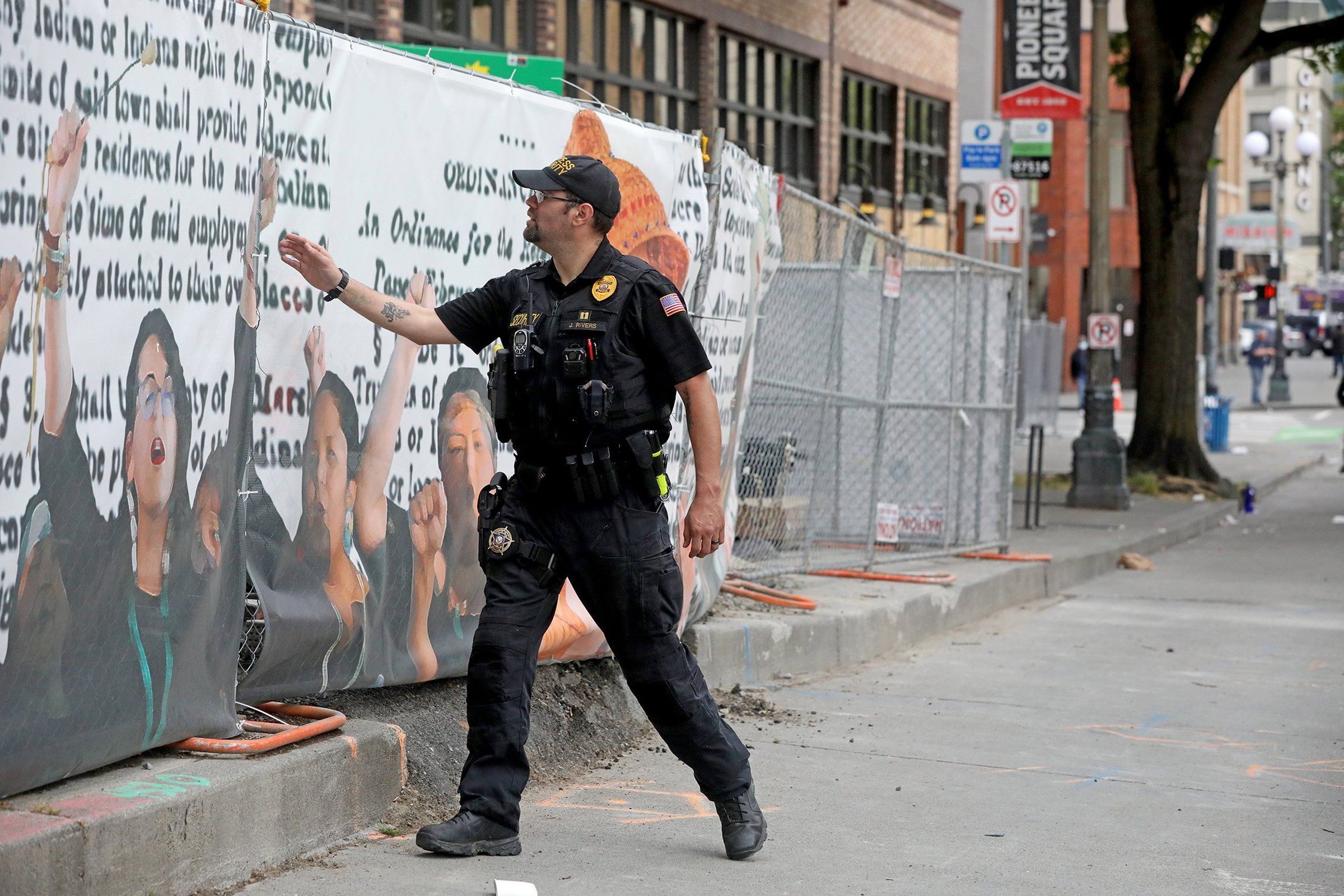More businesses fearing property damage hire private security guards in wake of protests

Seattle WA June 12 2020 Private security contractor Denise Bamba remembers the point last week when she couldn’t get off the telephone.
It was the Monday after weekend protests occurred in downtown Seattle over the Minneapolis police killing of George Floyd. Fortress Security Services, co-owned by Bamba and her husband, Deschamps, was besieged by local businesses seeking armed guards to protect their property.
“My phone shows I logged more than 200 calls that day,’’ said Denise Bamba, adding the couple turned down numerous requests because the company didn’t have enough guards.
Other security companies also reported an uptick in protection requests from businesses of all sizes and residential complexes downtown, in Capitol Hill, Pioneer Square and even Redmond, West Seattle and Tukwila. Fueling the surge, they say, are fears police consumed with controlling protests won’t prioritize property protection.
The push toward private security began during the coronavirus pandemic closures, with businesses fearing break-ins on abandoned streets. It continued even as businesses reopened, with staff sometimes encountering unusually hostile customers seemingly stressed out by the pandemic. Then, things really took off once the protests began.
Deschamps Bamba said commercial construction sites are the company’s fastest-growing clients as vandals and thieves “take advantage of the current climate.” Higher-end residential clients have also sought beefed-up security, including two apartment complexes near the Capitol Hill protests.
“People understand that all of the police resources are geared towards the protests,” he said. “It leaves all of these buildings vulnerable to break-ins and causing problems.”
Fortress Security Services Field Operations Manager Joseph Rivers patrols a construction site Wednesday in Seattle. He stops to converse in sign… (Greg Gilbert / The Seattle Times) More
There’s often little to differentiate private security guards — many hailing from military or law-enforcement backgrounds — from actual police officers, though state law requires they wear at least two visible “security” identifiers. The guards typically sport bulletproof vests over dark uniforms while driving stylized patrol cars bearing high resemblance to police vehicles.
But while some carry weapons including pepper spray, batons, Tasers, pistols and even rifles, many security companies are acutely aware of the stigma attached to excessive force. They train guards to practice “verbal judo” to de-escalate tense situations by talking to people and treating them with respect and courtesy.
And when hired for armed jobs, the companies preach that weapons only be used as a last resort.
The state requires firearms certification for guards carrying guns and generally allows them to use weapons only in self-defense or when a serious felony is being committed.
Chris La Due, co-owner of Homeland Patrol Division Security, said his company’s phones were “ringing off the hook’’ with calls from downtown and Capitol Hill businesses seeking last-minute, urgent protection for “just a few days” once protests began.
Company co-owners La Due, Josh Stivers and Steve Pansini all have former military or law-enforcement backgrounds, as do some guards. But while the company offers armed security, none of its guards deployed throughout the Seattle area — even in places where protests have occurred — currently carry weapons.
The company has its guards go through classes on cultural diversity to avoid racial profiling and other problems that unnecessarily inflame situations.
The guards are taught to never take an aggressive, forceful approach to removing vagrants or other trespassers from a property.
“You start off by saying, ‘How are you doing sir?’ How can I help you today?’ Security is very, very much customer service,” Stivers said.
Business is booming: The company saw a new client surge during the coronavirus shutdowns from apartment complexes, department store chains and small business groups.
Homeland temporarily offered free services to 25 smaller businesses to “give back” to the community. While the intent wasn’t to land them as permanent customers, the company said some short-term clients do stay longer after having their eyes opened to the benefits of private security. Once the protests started, some existing clients ordered extra patrols.
“You talk to probably any business owner in the downtown core, they’ll tell you just straight up that Seattle police response time is not the best,’’ Stivers said of nonemergency calls like property crimes. “It’s slow if it isn’t fire, flood or blood. And I don’t think it’s only Seattle, but just the general response time when you call 911 — it’s a slow response.’’
While Seattle police statistics show they take about six minutes to respond to top priority emergency calls, they’ve conceded their response to lower priority cases — including burglary and property theft — could be better. The median response time for Priority 2 calls — including in-progress property crimes or those that have just happened — was 18 minutes last year, compared with 13 minutes in 2014.
For lower Priority 3 and 4 calls — including break-ins that didn’t just occur — the median response time last year was 49 minutes, compared with 35 minutes five years ago. Police have largely attributed the decline to declines in staffing amid increased crime in a growing city.
The promise of a quicker response has been a big part of the lure toward private security companies.
Ballard Alliance executive director Mike Stewart said his association’s board hired Fortress in March to protect more than two dozen smaller businesses as the state’s stay-home order was implemented. “There had been a few break-ins along Ballard Avenue and business owners were growing concerned about the safety of their empty storefronts,” Stewart said by text message.
Though he said the decision has provided “peace of mind” to business owners, it’s unclear how long they’ll keep the security. “We’ll definitely have that discussion with our board after things normalize,” he wrote.
Converting short-term clients into permanent ones is the goal of any security company. Fortress and Homeland say they have turned away more short-term, protest-related security requests than they have accepted because they’ve prioritized existing clients.
Michael James, owner and CEO of Blue Star Security, said his company rarely provides short-term protection because it’s too much of a headache.
“This would be something where they’d have an acute need — like during riots and what have you — and then it’s gone,’’ James said. “We tend to turn away business like that because we’d much rather have long-term contracts as opposed to something that lasts tonight for four hours and then I’ll spend two hours working up a contract and invoicing and billing and depositing a check.
In-depth journalism takes time and effort to produce, and it depends on paying subscribers. If you value these kinds of stories, consider subscribing.
“In the end, it’s just not worth it working for four hours.’’
Not to mention, short-term hot spots can get tense fast.
Fortress field operations commander Joseph Rivers suffered one cracked rib and another bruised one when an unidentified object struck his vest while he was providing protection for a KIRO 7 news crew during Capitol Hill protests early last week. The protection detail following the crew swapped out its uniforms for street clothes after one day, concerned they were being mistaken for police and inflaming tensions. Rivers said while his guards have used their hands to redirect some people away from clients and verbally confronted protesters, nothing has become overtly physical.
“Our goal is to effectively get the job done with the least amount of force possible.”
Fortress guards carry pepper spray, batons and Tasers and some have pistols. It offers voluntary training on deploying pepper spray and Tasers through a federal program.
But Rivers said he trains guards to never openly carry or display weapons. He’ll fire anyone needlessly jumpy or aggressive, preferring guards “get themselves out of the situation” and call police before resorting to even pepper spray.
Fortress guards wear body cameras to protect them from unfounded accusations and discourage overzealous uses of force.
“We do what we can to protect property within reason,” he said. “We are not going to jeopardize someone’s life or put someone’s life in danger because of property.”
Seattle Times




